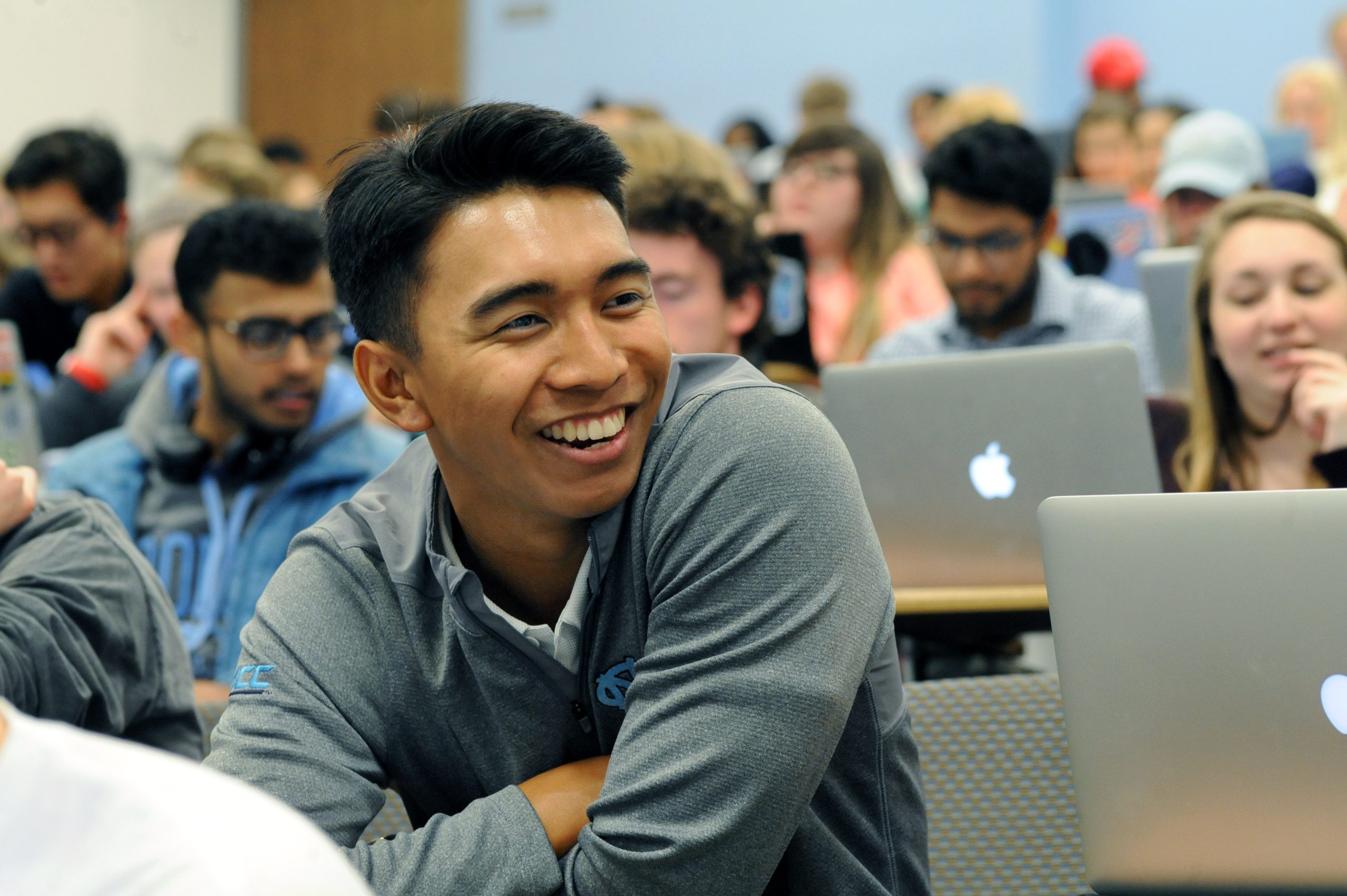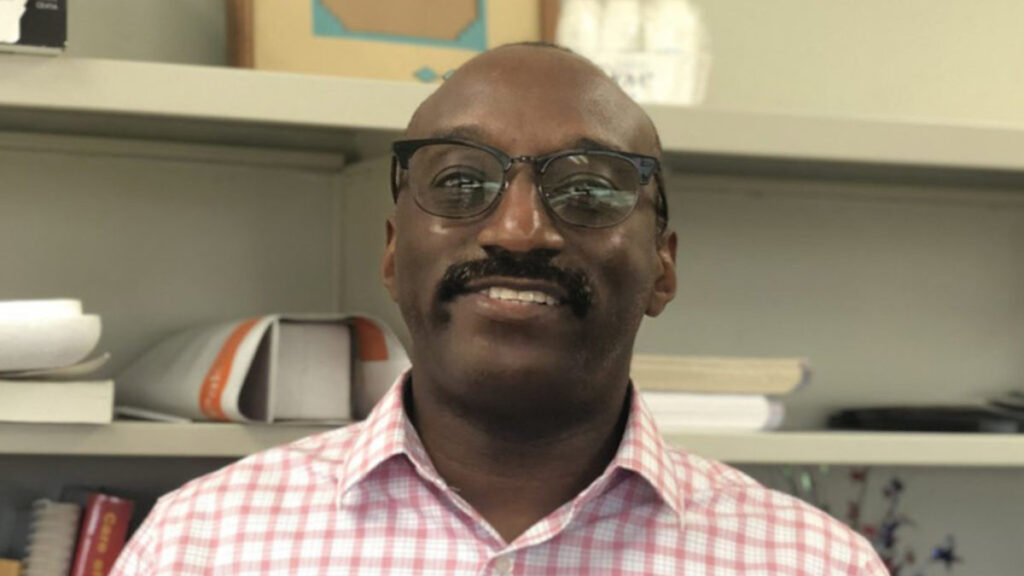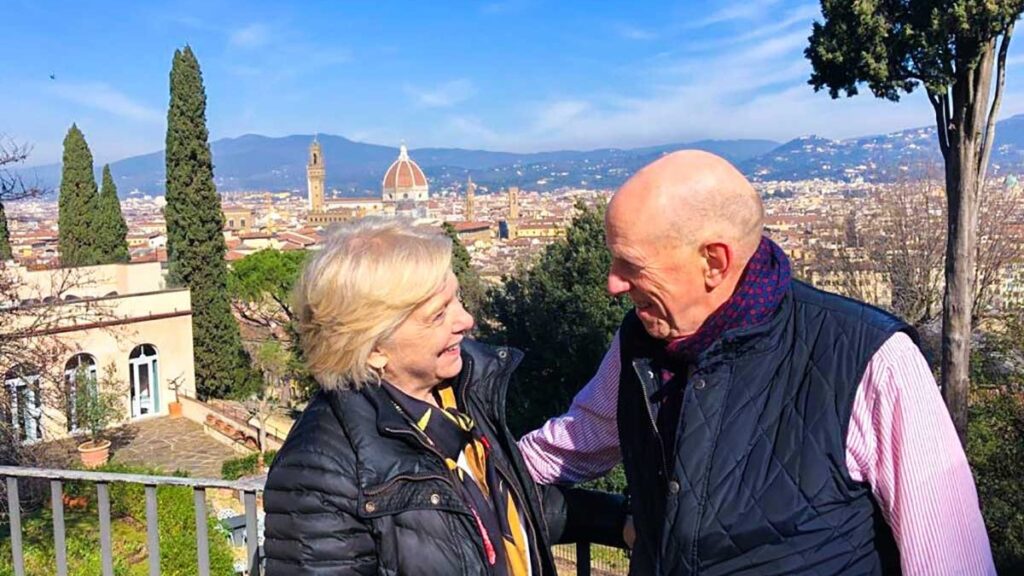Supporting the New Undergraduate General Education Curriculum
January 30, 2023

A student in the Triple-I course, “Understanding Health and Happiness,” piloted in spring 2019. Each Triple-I course brings together three outstanding professors from different departments across the University so that students can study a common theme from several perspectives. Triple-I is part of the First Year Foundations requirement of the new IDEAs in Action curriculum. (Photo by Donn Young)
With the goal of ensuring that Carolina undergraduates gain the skills and knowledge needed to become lifelong learners, UNC launched a new undergraduate general education curriculum in fall 2022. Known as IDEAs in Action, the curriculum is designed to be innovative, inclusive and global. IDEA stands for identify, discover, evaluate and act — and it focuses on four main outcomes for students:
- Identify pressing questions, problems and issues
- Discover ideas, evidence and methods that inform these questions
- Evaluate these ideas, evidence and methods
- Act on the basis of these evaluations.
A key element of the curriculum is a more structured first-year experience with a set of five required courses called First Year Foundations. The classes include First Year Seminars and First Year Launches; University Writing; a Global Language; Ideas, Information and Inquiry (known colloquially as Triple-I); and College Thriving. Students may take the courses either semester of their first year.

(Jon Gardiner/UNC-Chapel Hill)
“The literature indicates that it’s beneficial for students to have a shared and introductory experience in their first semester,” said Nick Siedentop, director of undergraduate curricula in the Office of Undergraduate Education. “Giving students the foundation for how to succeed as a college student — how to be resilient when they experience challenges during their academic career and how to explore UNC’s different programs and majors — offers them a great start.”
Thanks to a recent gift from donors Justin ’94 and Emily Haynie ’96, whose son is a current Tar Heel, the College is able to implement this more structured first-year experience. Students develop their own path while honing strategies needed to contribute to the world as engaged citizens, scholars, community members and leaders. They will also strengthen their abilities to think critically, work collaboratively and communicate persuasively. The Haynie Family Undergraduate Education Fund is providing funding for the development and enhancement of First Year Seminars, First Year Launch courses, College Thriving and Triple-I courses. While the Haynie Family Endowment Fund builds to support the undergraduate curriculum in perpetuity, the expendable portion of their gift has already been put to work.
“As Carolina alumni, and now parents, we were particularly interested in the small class settings of First Year Seminars and Launch courses and how they introduce students to life at Carolina and help them make connections with faculty,” said the Haynies.
“The biggest goal is for students to develop meaningful connections on campus, create strategies for academic success and reflect on the ways that resilience and well-being will support their ability to reach their full potential both in and out of the classroom,” said Marsha Dopheide, a teaching assistant professor in psychology and neuroscience who leads the new College Thriving initiative.
Justin Forbes ’25 said that it can be a tough transition from high school to college. After juggling many extracurricular activities while excelling academically in his Pennsylvania high school, he assumed that the same tactics he used in high school would work at UNC.
“College is different in many ways, especially as someone who came from a small high school where I knew all my teachers by name, and they knew me,” said the biomedical engineering major.
After completing one of the College Thriving pilot classes, Forbes said he believes this new addition to the curriculum is valuable in providing students ways to balance academics and extracurricular activities and prioritize mental health.
College Thriving is designed to empower students to participate fully in the opportunities of a major research university. Instructors hold weekly small group meetings with first-year students to provide a safe learning space to foster connections with peers, engage with varied campus resources and enhance students’ skills to thrive at Carolina and beyond.
“How is this new curriculum benefiting our students? We’ve asked ourselves that every day over the last few years as it was being developed, and we’ll continue to evaluate how well our intentions are actualized in students’ learning going forward,” said Abigail Panter, senior associate dean for undergraduate education. “We want all students to succeed — to be able to transition from high school to this large public global research university and then on to graduate study, a career and lifelong learning. We want to provide them with opportunities to practice the skills needed for life.
“Through IDEAs in Action — and thanks to supportive alumni and parents like Justin and Emily Haynie — students will explore their passions, reflect regularly on their learning and integrate ideas in new ways to prepare them for life beyond Carolina,” Panter said.
A version of this story appeared in the College’s Fall 2022 Carolina Arts and Sciences magazine.



